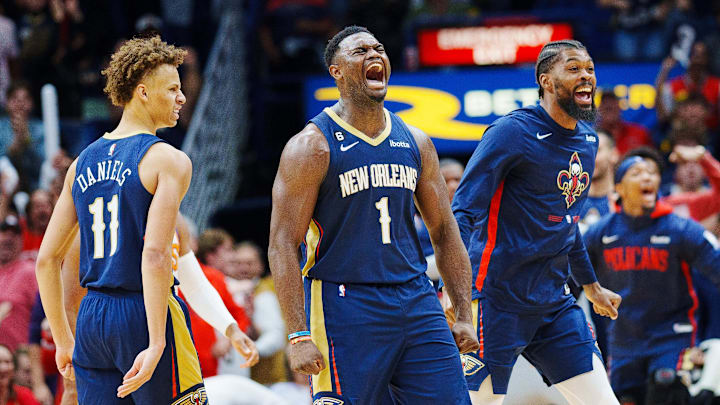New Orleans Pelicans starting shooting guard: Brandon Ingram
Is Brandon Ingram also underrated at this point? The Pelicans' god-awful season overshadowed Ingram's individual success. He averaged 24.9 points, 5.5 rebounds, and 5.8 assists on .484/.390/.882 splits in 34.2 minutes. He approached or exceeded his career-high marks in every category, frequently operating as the Pelicans' No. 1 option in Zion's absence.
The former No. 2 pick continues to add to his repertoire with each passing season. His 3-point shot has developed from a weakness into a strength. His high release point makes him especially deadly on mid-range pull-ups, while his length and footwork make up for limited strength at the rim. And that strength isn't as limited as it once was. Ingram still maintains the string-bean physique that earned him so many errant Kevin Durant comps at Duke, but he's no longer a complete toothpick.
That shows up most evidently on the defensive end. Ingram can handle difficult matchups on the perimeter and put his 7-foot-3 wingspan to good use away from the ball. Depending on who starts next to him on the wing next season, Ingram's burdensome offensive role could be paired with heightened defensive responsibilities. He's up to the task.
Ingram's versatility on offense is what ultimately makes him a perennial All-Star candidate. Ingram can handle the ball and run the offense, using his high vantage point to peer over the defense to make advanced passing reads out of the pick-and-roll. He can weaponize his height to score over smaller defenders or use his speed to scoot around slower defenders. Put him off the ball, and Ingram will comfortably bomb 3s. He can play initiator, connector, or finisher. He's still very, very good, folks.
Primary backup shooting guard: Dyson Daniels
Dyson Daniels was a victim of the Pelicans' depth as a rookie. He managed 17.7 minutes per game with averages of 3.8 points, 3.2 rebounds, and 2.3 assists on .418/.314/.650 splits. One glance at the numbers and it wouldn't be hard to brush Daniels aside and forget about him. That would be a mistake.
The former No. 8 pick is due for a major second-year leap. The offensive numbers will still remain limited — Daniels doesn't create his own shot very often and he's a mediocre shooter — but he's a wizard passing the ball, his head constantly on a swivel with the advanced processing speed of the most cutting-edge computer model. He's going to make the extra pass and make a point to elevate those around him. The Pelicans have finishers; Daniels will connect the dots.
Where Daniels really shines, however, is the defensive end. He's 6-foot-6 and pesky in passing lanes with a 6-foot-11 wingspan that ball-handlers have a tough time navigating at the point of attack. New Orleans already has a defensive specialist who can't shoot, so Daniels' jump shot progress is essential, but he's going to be a high-level role player.
Other players who could receive minutes at shooting guard: Jordan Hawkins, CJ McCollum, Trey Murphy III, Kira Lewis Jr.
The Pelicans burned the No. 14 pick in June's NBA Draft on Jordan Hawkins. It was a debatable use of such a high pick, but Hawkins led UConn to the NCAA championship with his torrid outside shooting. He's probably the best movement shooter in the draft and that skill alone could be enough to make him a valuable rotation cog — especially for a team built around a paint force like Zion.
